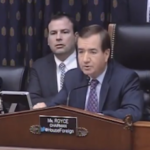BBG Watch Commentary
Wednesday, April 15, 2015, at 10 a.m., U.S. Rep. Ed Royce (R-CA), Chairman of the House Foreign Affairs Committee, will convene a hearing to examine Russia’s use of media to destabilize Ukraine, Eastern Europe and beyond, and the U.S. government’s inability to respond effectively.
In a Wall Street Journal op-ed published Tuesday, “Countering Putin’s Information Weapons of War,” Chairman Royce argues that Kremlin propaganda is far outstripping U.S. ability to get the truth out.
In his op-ed, Rep. Royce wrote that the joint VOA and RFE/RL 30-minute Russian-language television news program “Current Time” broadcast to Lithuania, Moldova, Georgia, Ukraine and Latvia was taken off the air in Latvia after only four months “due to a lack of viewership.” Due to the late hour in Washington, BBG Watch was unable to confirm this information.
CHAIRMAN ROYCE: “The BBG [Broadcasting Board of Governors] undermined the U.S. broadcasting services, hollowing out those in Europe and leaving them unable to defend against Russia’s resurgent information war.
Responding to the invasion and occupation of parts of Ukraine, the BBG launched a joint VOA and RFE/RL venture in October called ‘Current Time’—a 30-minute Russian-language news television program that was broadcast to Lithuania, Moldova, Georgia, Ukraine and Latvia. But after only four months, the program was taken off the air in Latvia due to a lack of viewership.”
(…)
“Righting this ship must be an urgent foreign-policy priority. I will soon introduce bipartisan legislation to do just that. The bill would charge one U.S. broadcasting organization (VOA) with reporting U.S. policy and other global news, and another, including RFE/RL and similar services, to act as the free press in repressive societies like Russia. Each organization will have its own CEO and its own board, with accountability that is clear to all.”
READ MORE: Countering Putin’s Information Weapons of War Kremlin propaganda is far outstripping our ability to get the truth out. The U.S. needs a new approach. Ed Royce, The Wall Street Journal, April 14, 2015
Some former and current VOA English newsroom reporters and managers expressed strong reservations about the language in last year’s bipartisan bill to reform the BBG, H.R. 4490. The bill won unanimous approval from the House Foreign Affairs Committee and the House of Representatives, but it was not voted on in the Senate in 2014. It must be reintroduced and passed by both houses of Congress and signed by the President to become law.
Al Pessin, a VOA foreign correspondent, criticized the original bill in his The Los Angeles Times op-ed, “Back off, Congress, and keep Voice of America real.”
While the title of the op-ed was probably chosen by the editorial staff, the author, who represented only himself, kept referring to the bill as “the Royce bill,” even though the legislation was fully bipartisan. It was introduced in 2014 by both Chairman Royce and Ranking Foreign Affairs Committee member Rep. Eliot Engel (D-NY).
In July 2014, Voice of America reported on the controversy over the bill’s language.
VOA NEWS: “Some current and former VOA journalists say they agree that changes to management are urgently needed, but they are worried about language in the House bill that calls on the Voice of America to promote U.S. foreign policy while being a fair and accurate source of news. The bill also would reduce the scope of VOA’s coverage from world news to U.S. news and policy.
Former VOA deputy director Alan Heil says those changes would be devastating:
‘If that bill becomes law, VOA’s worldwide following on radio, TV and online channels would plummet precipitously. The Voice’s greatest asset, its credibility, would be in shreds,’ said Heil.”
Despite reservations about some of the language in H.R. 4490, the union representing Voice of America and other BBG federal employees, AFGE Local 1812, expressed strong support for the bill because of its management reforms provisions.
A broad coalition of former members of the Broadcasting Board of Governors, journalists, and former BBG employees sent an open letter to President Obama expressing support for H.R. 4490 management reform provisions and for the VOA Charter.
Broadcasting Board of Governors chairman Jeff Shell said in a recent meeting with employees that Rep. Ed Royce cares about U.S. international media outreach and is a good man, but in order to get the reform legislation passed he must stress what is wrong with the agency rather than what VOA and other journalists are doing right. Shell said that the agency needs new legislation to strengthen the role of its CEO. Shell is believed to favor having only one board and one CEO.
The White House and the State Department also appear to have some reservations about Chairman Royce’s proposal to have two boards and two top executives in charge of the federal and the non-federal components of the agency.
The board under Jeff Shell’s chairmanship has initiated some internal reforms.
At a meeting with employees at the Voice of America in Washington last week, VOA Director David Ensor announced that he submitted his resignation to the Broadcasting Board of Governors and wants to leave by end of May. Well-informed sources told BBG Watch that a permanent replacement for David Ensor is not likely to be named until the federal agency in charge of VOA and other U.S. taxpayer-funded media organizations serving audiences abroad also has a new permanent CEO. First BBG CEO Andy Lack had left earlier this year after only a few weeks on the job.
Background Material
RT Anchor Who Quit
One of the witnesses scheduled to testify at the April 15 House Foreign Affairs Committee hearing is Liz Wahl, a former RT anchor who quit on the air to protest RT’s disinformation campaign over Crimea and Ukraine
ALSO SEE:
Andy Lack on RT
 Former Broadcasting Board of Governors director and CEO Andy Lack made a strong statement about Russia’s propaganda war before he left the agency after only a few weeks in the job, as reported by The New York Times:
Former Broadcasting Board of Governors director and CEO Andy Lack made a strong statement about Russia’s propaganda war before he left the agency after only a few weeks in the job, as reported by The New York Times:
ANDY LACK: “We are facing a number of challenges from entities like Russia Today which is out there pushing a point of view, the Islamic State in the Middle East and groups like Boko Haram, “ he said. “But I firmly believe that this agency has a role to play in facing those challenges.”
State Department Spokesperson Jen Psaki on RT
 Andy Lack’s comment drew a strong condemnation from Russia’s RT. State Department spokesperson Jen Psaki in answering questions posed by an RT correspondent in Washington said that the State Department agrees with “challenges and certainly concerns that I think the new head of BBG was expressing.” She also said: “I think the broad point is the U.S. Government – would the U.S. Government put those three in the same category? No, we wouldn’t.”
Andy Lack’s comment drew a strong condemnation from Russia’s RT. State Department spokesperson Jen Psaki in answering questions posed by an RT correspondent in Washington said that the State Department agrees with “challenges and certainly concerns that I think the new head of BBG was expressing.” She also said: “I think the broad point is the U.S. Government – would the U.S. Government put those three in the same category? No, we wouldn’t.”
Jen Psaki
Spokesperson
Daily Press Briefing
Washington, DC
January 23, 2015
QUESTION: The newly appointed chief executive of the BBG said his agency faces a number of, quote-un-quote, challenges – Russia Today, the Islamic State, and Boko Haram – all in one sentence. Would you call those remarks appropriate or inappropriate?
MS. PSAKI: Well, I think, one, let me note that the Broadcasting Board of Governors is an independent federal agency supervising all U.S. Government-supported civilian international media. I’d certainly point you to them for specifics. I think the broad point is the U.S. Government – would the U.S. Government put those three in the same category? No, we wouldn’t. However, there are concerns, I think, that our – we agree with in terms of the fact that the – Russia’s own independent media space is shrinking and the Kremlin continues to apply pressure on the few remaining outlets. And while RT is available to many viewers in the United States – you’re here in the briefing room today – many Russian authorities have curtailed the ability of BBG broadcasters to broadcast there. So those are challenges and certainly concerns that I think the new head of BBG was expressing.
QUESTION: Do you have – just to clarify, do you have any problem with the way he put it?
MS. PSAKI: I think I’d point you to them, and I just stated that wouldn’t be the way that we would state it from here.
QUESTION: How would you state it?
MS. PSAKI: We wouldn’t state it in those terms.
QUESTION: Well, the Secretary of State is a member of the BBG.
MS. PSAKI: Sure. I just stated the concerns we have, which we agree with.
QUESTION: Right.
MS. PSAKI: I would state it in that way.
QUESTION: Okay. So you would not, then, put RT in the same category as Boko Haram and —
MS. PSAKI: That’s what I just said two minutes ago.
QUESTION: Yeah, but you would agree that it is a challenge and —
MS. PSAKI: Correct, I said both of those things.
Stengel and Kerry on RT as a propaganda machine

However, both Secretary of State Kerry and Under Secretary Stengel were not shy earlier in describing RT as the Kremlin’s propaganda and distortion machine.
Richard Stengel, who is a former managing editor of TIME magazine, wrote last April that “RT is a distortion machine, not a news organization.”
RICHARD STENGEL: “…when propaganda poses as news it creates real dangers and gives a green light to violence.
Sometimes it’s even too much for the people paid to make these claims. The network’s clear bias led to an unprecedented on-air rebellion. First, the host of RT America, Abby Martin, condemned Russia’s invasion of Crimea on a broadcast. Then one of the network’s anchors, Liz Wahl, resigned on air, saying, ‘I cannot be part of a network funded by the Russian government that whitewashes the actions of Putin.’
Yet, even so, I would defend the right of RT to broadcast.”
While saying that RT represented a challenge for the Broadcasting Board of Governors, former BBG CEO Andy Lack did not question RT’s right to broadcast, did not call it a terrorist organization, and did not propose that the BBG respond to RT with its own propaganda.
There seems to be a general agreement among most if not all House Foreign Affairs Committee members and Broadcasting Board of Governors members that propaganda is not the answer to RT’s propaganda. There seems to be less consensus on what should be the link, if any, between the BBG, the Voice of America and the U.S. foreign policy establishment.
The language in the H.R. 4490 was somewhat unclear and contradictory on this issue and is expected to be modified. Neither Democrats nor Republicans in Congress want any administration to use the Voice of America to promote short term foreign policy goals over which there is no national and bipartisan consensus. The new emphasis is likely to be on a media outreach philosophy that is consistent with the long term U.S. foreign policy goals and the 1976 VOA Charter.
RT Called ‘Propaganda Bullhorm’
Last April, Secretary of State John Kerry called RT a “propaganda bullhorn.”
JOHN KERRY: “In fact, the propaganda bullhorn that is the state sponsored Russia Today program has been deployed to promote — actually, Russia Today network, has deployed to promote President Putin’s fantasy about what is playing out on the ground,” he said.
“They almost spend full time devoted to this effort, to propagandize and distort what is happening or not happening in Ukraine.”
As with Andy Lack, RT also demanded an apology from John Kerry, but apparently did not get it.
SEE: ‘Propaganda bullhorn’: John Kerry attacks RT during Ukraine address, RT, April 25, 2014.
Royce Asks Kerry to Support BBG Reform

At a House Foreign Affairs Committee hearing on February 25, 2015, Secretary of State John Kerry testified about the FY 2016 budget request for the State Department and was asked by Chairman Royce to support new legislation to reform the BBG. The FY 2016 budget request for the BBG is $751 million.
Rep. Royce asked Secretary of State John Kerry for the Administration’s “active backing” to again push for reform of the Broadcasting Board of Governors, a federal agency which former Secretary of State Hillary Clinton called “dysfunctional.” Secretaries of State are ex officio members of the bipartisan BBG board.
REP. ED ROYCE (R-CA): “In Eastern Europe, Russia’s military aggression is matched only by the size its propaganda. Russia is spending more than $1.5 billion annually to mislead audiences, sow divisions, and push conspiracy theories out over RT Television. Yet the agency charged with leading our response, the Broadcasting Board of Governors (“BBG”), is – as your predecessor testified to us – dysfunctional. Last Congress, the House passed legislation authored by Ranking Member Engel and me to fix the BBG — the Broadcasting Board of Governors. We hope to have the Administration’s active backing as we again push this reform.”
Secretary Kerry expressed 100% support for Chairman Royce’s efforts to pass legislation this year reforming the Broadcasting Board of Governors, the federal agency in charge of U.S. media outreach abroad, while noting some reservations as to whether the agency should have one or two CEOs. Kerry also asked for more money for the BBG “to confront Russian propaganda” and “to get reform that this troubled agency needs.”
In response to a request from Chairman Royce for assistance from in getting a new version of the Broadcasting Board of Governors reform legislation passed by the U.S. Senate this year “to confront Russian propaganda” and “to get reform that this troubled agency needs,” Secretary Kerry said:
“All I can say, Mr. Chairman, I’m with you 100% on this. I look forward to working with you further. I appreciate your leadership.”
“I’ve had long conversations with our Undersecretary for Public Diplomacy Rick Stengel, who is very seized with some things we need to try to achieve,” Kerry added.
Secretary Kerry pointed out that there is some disagreement as to whether the BBG needs two CEOs, one for the federal part of the agency, which includes the Voice of America, and another one for the non-federal part of the agency composed of surrogate media outlets which are federal grantees. They include Radio Free Europe / Radio Liberty, Radio Free Asia, and Middle East Broadcasting Networks, Inc.
